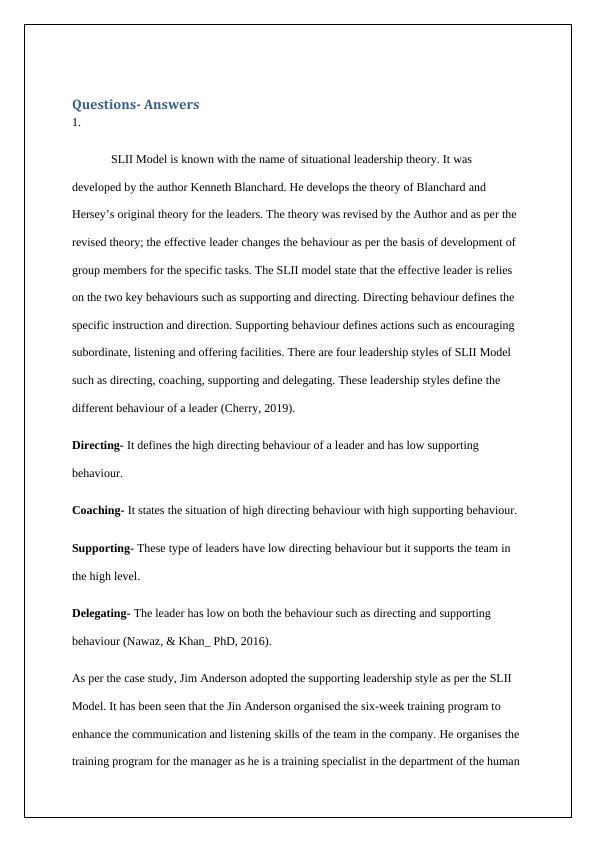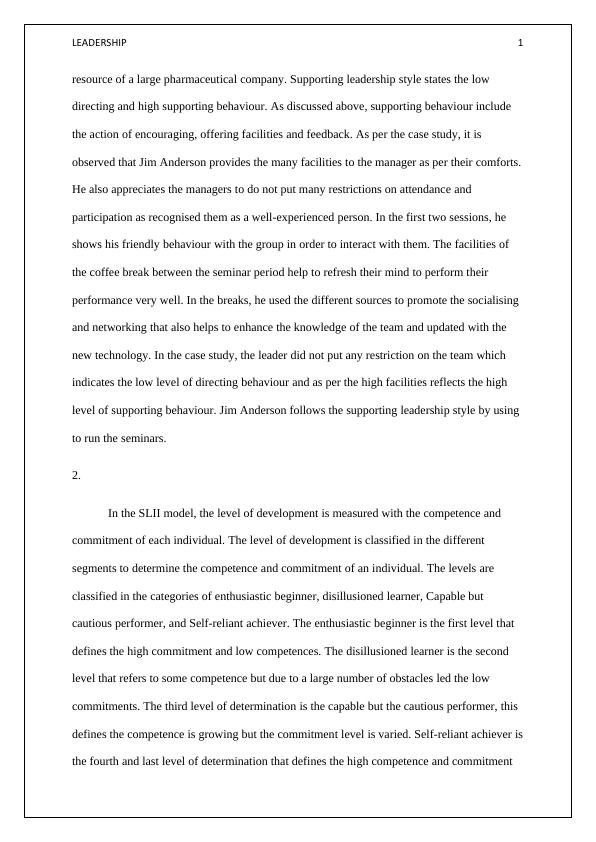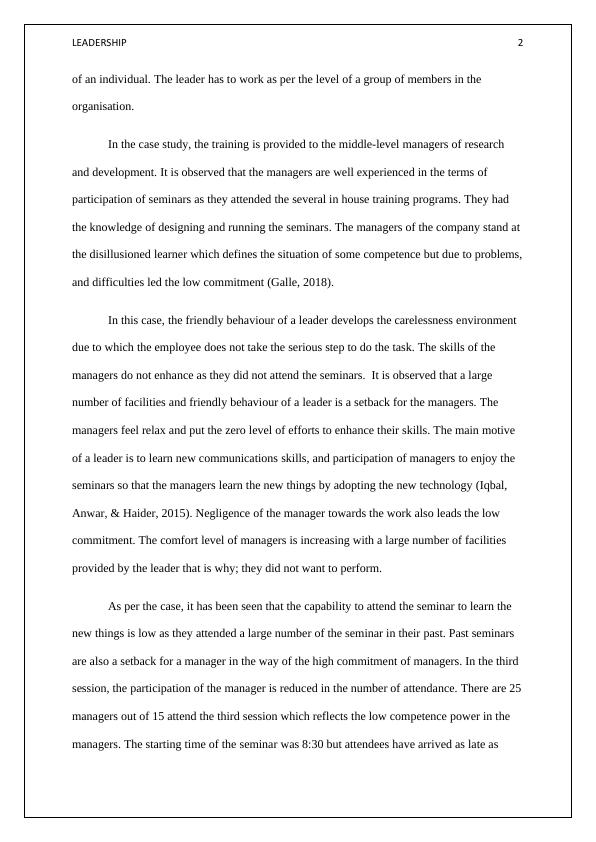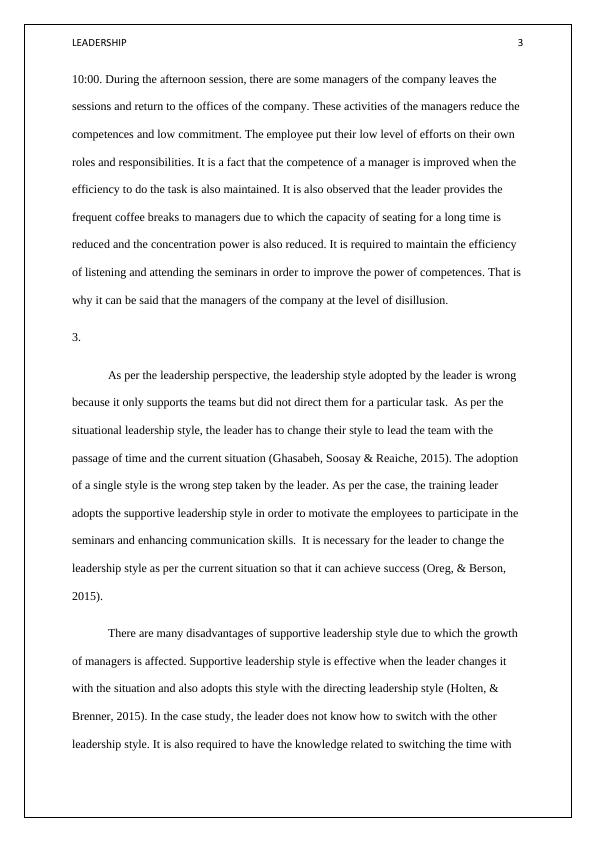Improving Seminars for Managers
Added on 2023-01-16
11 Pages3204 Words57 Views
Questions- Answers
1.
SLII Model is known with the name of situational leadership theory. It was
developed by the author Kenneth Blanchard. He develops the theory of Blanchard and
Hersey’s original theory for the leaders. The theory was revised by the Author and as per the
revised theory; the effective leader changes the behaviour as per the basis of development of
group members for the specific tasks. The SLII model state that the effective leader is relies
on the two key behaviours such as supporting and directing. Directing behaviour defines the
specific instruction and direction. Supporting behaviour defines actions such as encouraging
subordinate, listening and offering facilities. There are four leadership styles of SLII Model
such as directing, coaching, supporting and delegating. These leadership styles define the
different behaviour of a leader (Cherry, 2019).
Directing- It defines the high directing behaviour of a leader and has low supporting
behaviour.
Coaching- It states the situation of high directing behaviour with high supporting behaviour.
Supporting- These type of leaders have low directing behaviour but it supports the team in
the high level.
Delegating- The leader has low on both the behaviour such as directing and supporting
behaviour (Nawaz, & Khan_ PhD, 2016).
As per the case study, Jim Anderson adopted the supporting leadership style as per the SLII
Model. It has been seen that the Jin Anderson organised the six-week training program to
enhance the communication and listening skills of the team in the company. He organises the
training program for the manager as he is a training specialist in the department of the human
1.
SLII Model is known with the name of situational leadership theory. It was
developed by the author Kenneth Blanchard. He develops the theory of Blanchard and
Hersey’s original theory for the leaders. The theory was revised by the Author and as per the
revised theory; the effective leader changes the behaviour as per the basis of development of
group members for the specific tasks. The SLII model state that the effective leader is relies
on the two key behaviours such as supporting and directing. Directing behaviour defines the
specific instruction and direction. Supporting behaviour defines actions such as encouraging
subordinate, listening and offering facilities. There are four leadership styles of SLII Model
such as directing, coaching, supporting and delegating. These leadership styles define the
different behaviour of a leader (Cherry, 2019).
Directing- It defines the high directing behaviour of a leader and has low supporting
behaviour.
Coaching- It states the situation of high directing behaviour with high supporting behaviour.
Supporting- These type of leaders have low directing behaviour but it supports the team in
the high level.
Delegating- The leader has low on both the behaviour such as directing and supporting
behaviour (Nawaz, & Khan_ PhD, 2016).
As per the case study, Jim Anderson adopted the supporting leadership style as per the SLII
Model. It has been seen that the Jin Anderson organised the six-week training program to
enhance the communication and listening skills of the team in the company. He organises the
training program for the manager as he is a training specialist in the department of the human

LEADERSHIP 1
resource of a large pharmaceutical company. Supporting leadership style states the low
directing and high supporting behaviour. As discussed above, supporting behaviour include
the action of encouraging, offering facilities and feedback. As per the case study, it is
observed that Jim Anderson provides the many facilities to the manager as per their comforts.
He also appreciates the managers to do not put many restrictions on attendance and
participation as recognised them as a well-experienced person. In the first two sessions, he
shows his friendly behaviour with the group in order to interact with them. The facilities of
the coffee break between the seminar period help to refresh their mind to perform their
performance very well. In the breaks, he used the different sources to promote the socialising
and networking that also helps to enhance the knowledge of the team and updated with the
new technology. In the case study, the leader did not put any restriction on the team which
indicates the low level of directing behaviour and as per the high facilities reflects the high
level of supporting behaviour. Jim Anderson follows the supporting leadership style by using
to run the seminars.
2.
In the SLII model, the level of development is measured with the competence and
commitment of each individual. The level of development is classified in the different
segments to determine the competence and commitment of an individual. The levels are
classified in the categories of enthusiastic beginner, disillusioned learner, Capable but
cautious performer, and Self-reliant achiever. The enthusiastic beginner is the first level that
defines the high commitment and low competences. The disillusioned learner is the second
level that refers to some competence but due to a large number of obstacles led the low
commitments. The third level of determination is the capable but the cautious performer, this
defines the competence is growing but the commitment level is varied. Self-reliant achiever is
the fourth and last level of determination that defines the high competence and commitment
resource of a large pharmaceutical company. Supporting leadership style states the low
directing and high supporting behaviour. As discussed above, supporting behaviour include
the action of encouraging, offering facilities and feedback. As per the case study, it is
observed that Jim Anderson provides the many facilities to the manager as per their comforts.
He also appreciates the managers to do not put many restrictions on attendance and
participation as recognised them as a well-experienced person. In the first two sessions, he
shows his friendly behaviour with the group in order to interact with them. The facilities of
the coffee break between the seminar period help to refresh their mind to perform their
performance very well. In the breaks, he used the different sources to promote the socialising
and networking that also helps to enhance the knowledge of the team and updated with the
new technology. In the case study, the leader did not put any restriction on the team which
indicates the low level of directing behaviour and as per the high facilities reflects the high
level of supporting behaviour. Jim Anderson follows the supporting leadership style by using
to run the seminars.
2.
In the SLII model, the level of development is measured with the competence and
commitment of each individual. The level of development is classified in the different
segments to determine the competence and commitment of an individual. The levels are
classified in the categories of enthusiastic beginner, disillusioned learner, Capable but
cautious performer, and Self-reliant achiever. The enthusiastic beginner is the first level that
defines the high commitment and low competences. The disillusioned learner is the second
level that refers to some competence but due to a large number of obstacles led the low
commitments. The third level of determination is the capable but the cautious performer, this
defines the competence is growing but the commitment level is varied. Self-reliant achiever is
the fourth and last level of determination that defines the high competence and commitment

LEADERSHIP 2
of an individual. The leader has to work as per the level of a group of members in the
organisation.
In the case study, the training is provided to the middle-level managers of research
and development. It is observed that the managers are well experienced in the terms of
participation of seminars as they attended the several in house training programs. They had
the knowledge of designing and running the seminars. The managers of the company stand at
the disillusioned learner which defines the situation of some competence but due to problems,
and difficulties led the low commitment (Galle, 2018).
In this case, the friendly behaviour of a leader develops the carelessness environment
due to which the employee does not take the serious step to do the task. The skills of the
managers do not enhance as they did not attend the seminars. It is observed that a large
number of facilities and friendly behaviour of a leader is a setback for the managers. The
managers feel relax and put the zero level of efforts to enhance their skills. The main motive
of a leader is to learn new communications skills, and participation of managers to enjoy the
seminars so that the managers learn the new things by adopting the new technology (Iqbal,
Anwar, & Haider, 2015). Negligence of the manager towards the work also leads the low
commitment. The comfort level of managers is increasing with a large number of facilities
provided by the leader that is why; they did not want to perform.
As per the case, it has been seen that the capability to attend the seminar to learn the
new things is low as they attended a large number of the seminar in their past. Past seminars
are also a setback for a manager in the way of the high commitment of managers. In the third
session, the participation of the manager is reduced in the number of attendance. There are 25
managers out of 15 attend the third session which reflects the low competence power in the
managers. The starting time of the seminar was 8:30 but attendees have arrived as late as
of an individual. The leader has to work as per the level of a group of members in the
organisation.
In the case study, the training is provided to the middle-level managers of research
and development. It is observed that the managers are well experienced in the terms of
participation of seminars as they attended the several in house training programs. They had
the knowledge of designing and running the seminars. The managers of the company stand at
the disillusioned learner which defines the situation of some competence but due to problems,
and difficulties led the low commitment (Galle, 2018).
In this case, the friendly behaviour of a leader develops the carelessness environment
due to which the employee does not take the serious step to do the task. The skills of the
managers do not enhance as they did not attend the seminars. It is observed that a large
number of facilities and friendly behaviour of a leader is a setback for the managers. The
managers feel relax and put the zero level of efforts to enhance their skills. The main motive
of a leader is to learn new communications skills, and participation of managers to enjoy the
seminars so that the managers learn the new things by adopting the new technology (Iqbal,
Anwar, & Haider, 2015). Negligence of the manager towards the work also leads the low
commitment. The comfort level of managers is increasing with a large number of facilities
provided by the leader that is why; they did not want to perform.
As per the case, it has been seen that the capability to attend the seminar to learn the
new things is low as they attended a large number of the seminar in their past. Past seminars
are also a setback for a manager in the way of the high commitment of managers. In the third
session, the participation of the manager is reduced in the number of attendance. There are 25
managers out of 15 attend the third session which reflects the low competence power in the
managers. The starting time of the seminar was 8:30 but attendees have arrived as late as

LEADERSHIP 3
10:00. During the afternoon session, there are some managers of the company leaves the
sessions and return to the offices of the company. These activities of the managers reduce the
competences and low commitment. The employee put their low level of efforts on their own
roles and responsibilities. It is a fact that the competence of a manager is improved when the
efficiency to do the task is also maintained. It is also observed that the leader provides the
frequent coffee breaks to managers due to which the capacity of seating for a long time is
reduced and the concentration power is also reduced. It is required to maintain the efficiency
of listening and attending the seminars in order to improve the power of competences. That is
why it can be said that the managers of the company at the level of disillusion.
3.
As per the leadership perspective, the leadership style adopted by the leader is wrong
because it only supports the teams but did not direct them for a particular task. As per the
situational leadership style, the leader has to change their style to lead the team with the
passage of time and the current situation (Ghasabeh, Soosay & Reaiche, 2015). The adoption
of a single style is the wrong step taken by the leader. As per the case, the training leader
adopts the supportive leadership style in order to motivate the employees to participate in the
seminars and enhancing communication skills. It is necessary for the leader to change the
leadership style as per the current situation so that it can achieve success (Oreg, & Berson,
2015).
There are many disadvantages of supportive leadership style due to which the growth
of managers is affected. Supportive leadership style is effective when the leader changes it
with the situation and also adopts this style with the directing leadership style (Holten, &
Brenner, 2015). In the case study, the leader does not know how to switch with the other
leadership style. It is also required to have the knowledge related to switching the time with
10:00. During the afternoon session, there are some managers of the company leaves the
sessions and return to the offices of the company. These activities of the managers reduce the
competences and low commitment. The employee put their low level of efforts on their own
roles and responsibilities. It is a fact that the competence of a manager is improved when the
efficiency to do the task is also maintained. It is also observed that the leader provides the
frequent coffee breaks to managers due to which the capacity of seating for a long time is
reduced and the concentration power is also reduced. It is required to maintain the efficiency
of listening and attending the seminars in order to improve the power of competences. That is
why it can be said that the managers of the company at the level of disillusion.
3.
As per the leadership perspective, the leadership style adopted by the leader is wrong
because it only supports the teams but did not direct them for a particular task. As per the
situational leadership style, the leader has to change their style to lead the team with the
passage of time and the current situation (Ghasabeh, Soosay & Reaiche, 2015). The adoption
of a single style is the wrong step taken by the leader. As per the case, the training leader
adopts the supportive leadership style in order to motivate the employees to participate in the
seminars and enhancing communication skills. It is necessary for the leader to change the
leadership style as per the current situation so that it can achieve success (Oreg, & Berson,
2015).
There are many disadvantages of supportive leadership style due to which the growth
of managers is affected. Supportive leadership style is effective when the leader changes it
with the situation and also adopts this style with the directing leadership style (Holten, &
Brenner, 2015). In the case study, the leader does not know how to switch with the other
leadership style. It is also required to have the knowledge related to switching the time with

End of preview
Want to access all the pages? Upload your documents or become a member.
Related Documents
Unit 4 – Management and Operationslg...
|45
|2658
|78
Management and Operations : Professional Studies Departmentlg...
|45
|2531
|26
Introduction to Managing and Leading Peoplelg...
|11
|3501
|32
Understanding and Leading Changelg...
|14
|671
|28
Remember the Titans Leadership Analysislg...
|10
|2881
|635
Leadership and Change Management | Assignmentlg...
|10
|2248
|36
